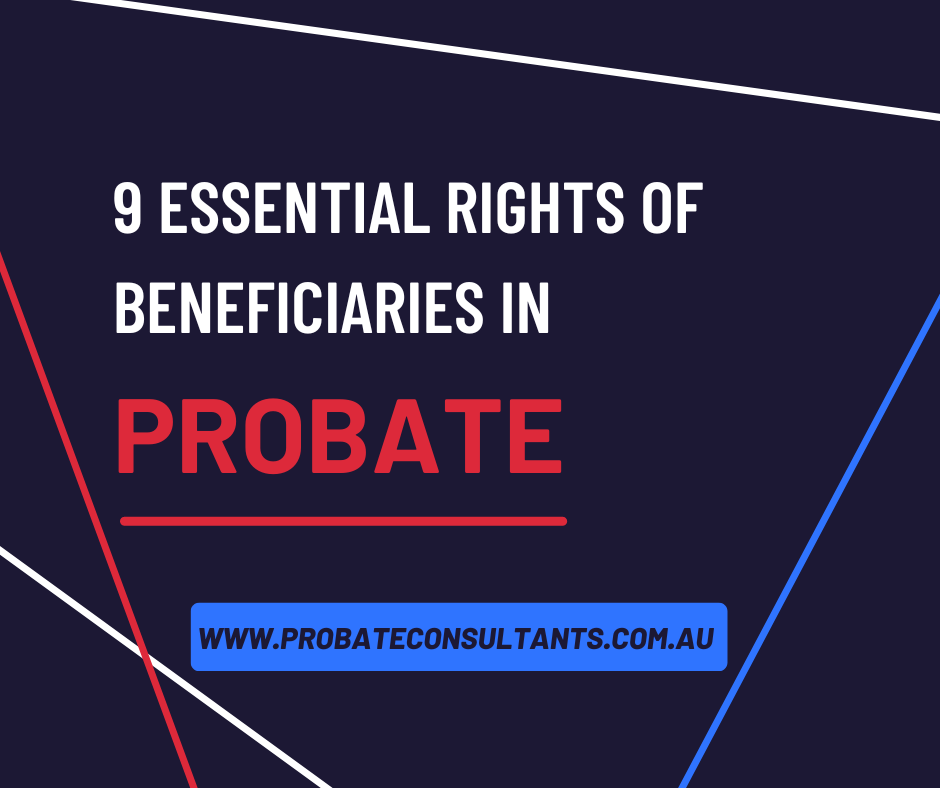Knowing your rights as a beneficiary in probate is essential before going through the process of settling an estate. Before exploring the rights, a beneficiary has, let’s understand the three prominent parties involved in Probate.
- There will be a testator who makes the formal Will. The estate in question was the possession of this testator when he/she was alive.
- Then we have executors and administrators. Every Probate will either have an executor of the Will or an administrator, who’d be responsible to distribute the estate following the death of the Will-maker.
- Finally, we have the beneficiaries. The beneficiaries of a Will are eligible to receive a part of the estate. These beneficiaries could be family members (you may also refer to next of kin meaning), friends, or other associates of the testator.
But in this post, we shall focus on the beneficiaries. Let’s discuss the 9 essential rights of beneficiaries when dealing with a probate court.
1. The Right to Receive Notices
As a beneficiary, you have the right to receive notices from the Probate Court regarding any and all proceedings related to the estate. It includes information about hearings and other matters that may affect your inheritance or any other interests in the estate.
2. The Right to Receive a Copy of the Will
The beneficiaries have the right to receive Will’s copy upon request to the executor of the estate. Sometimes, each and every individual named in the Will has the right to receive a copy of the Will, whether they are beneficiaries or not.
3. The Right to Receive Information
You have the right to receive information from anyone involved who administers the estate, including executors, administrators, trustees, and attorneys.
At times, the executors may not provide information and documents by default. But you, as a beneficiary, are entitled to place a request for the necessary documents. Such information must be provided upon request within 30 days after filing a written demand for it.
4. The Right to Apply for the Executor’s Removal
A beneficiary has the right to apply to the Court to order an executor to be removed from their position if they are not performing their duties, such as by failing to apply for a grant of probate within a reasonable amount of time, failing to keep the beneficiaries informed, or in any other way that could be construed as a breach of their fiduciary duty.
Although these orders are only used in the most severe cases of an executor’s misconduct, the beneficiary is nevertheless entitled to pursue such action.
5. The Right To Legal Representation
Executors of a Will often seek a qualified lawyer’s help to deal with a deceased’s estate. But, it is less known that beneficiaries also have the right to be legally represented. It is to ensure that your interests are considered every step of the way.
6. The Right To Seek An Accounting Of the Estate
The beneficiaries may not always be satisfied when dealing with the estate. There are possibilities to have conflicts over the accounting of the estate.
In such a case, you have the right to an accounting of the estate at your own cost. It needs an executor to provide detailed information on all the transactions of the estate. It may be regarding the bills paid, expenses incurred, or distribution
7. The Right To Seek An Order Directing Executors to Pay Claims Prior To Closing
You have the right under state law (in most states) to seek an order from the probate court directing executors to respond to your claim for payment of sums of money owed to you by an estate prior to the closing of said estate.
This right gives beneficiaries the opportunity to pursue payment for any money owed without having to contend with other claimants of the estate after it closes.
8. The Right To Seek A Stay Of Proceedings
If a trustee or administrator has taken action that you believe may harm your interests in an estate, then you have the right to seek a “stay of proceedings” from the probate court, which has jurisdiction over the estate being administered or litigated.
This right allows a beneficiary to prevent an immediate action by a trustee or an administrator that could harm such beneficiary’s interests without giving them time for the lawful resolution of the matter before the court.
9. The Right to Receive Their Share Within 12 Months
In the end, a beneficiary’s entitlement must receive their share of the estate typically within a year of the decedent’s passing. Also, it must be in accordance with the terms of the will.
Sum Up
These are the essential rights a beneficiary possesses in relation to Probate. Knowing these is necessary to avoid conflicts and disputes during the process.
More importantly, you should also know that these rights vary based on the legislation. Thus, you must refer the relevant legislation on Wills to your state in Australia before getting started.
Though you did refer to the right legislation, there is a chance you might still have doubts because Law is complicated. To avoid confusion, we advise you to seek legal advice from a lawyer and get the facts right before you act.
If you are looking for resources, you can check out Probate Consultants. They are professionals, so they understand every detail about the Grant of Probate in QLD.
⚠ Article Disclaimer
The above article is sponsored content any opinions expressed in this article are those of the author and not necessarily reflect the views of CTN News






